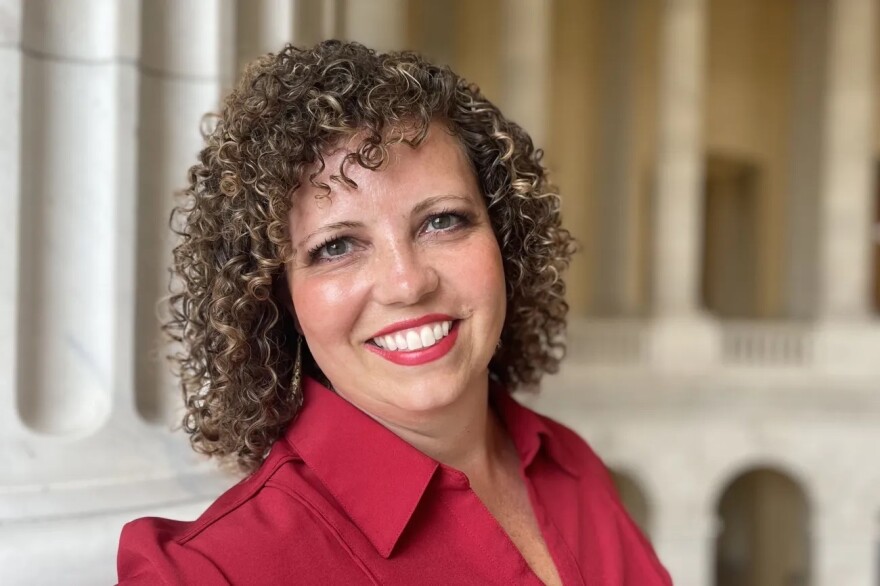Rural southwest Utah and Washington D.C. may be worlds apart, but Celeste Maloy hopes her experience in both resonates with voters in the special election for Utah’s 2nd Congressional District.
For the past four years, Maloy has worked on Washington’s Capitol Hill as legal counsel for the man she’s now vying to replace, resigning Rep. Chris Stewart. That connection, she said, should help her stand out to the voters who kept Stewart in office for six terms.
“I've seen representation done well and I've seen it done poorly,” Maloy said. “I know that good representation requires somebody who cares about the local issues and has an understanding of the local people.”
Even though Maloy snagged the GOP’s convention nomination, she faces two other candidates in the Sept. 5 primary. Both Becky Edwards and Bruce Hough gathered enough signatures to join Maloy on the ballot.
Maloy enjoys an advantage the other candidates don’t have. Stewart endorsed her as his replacement.
“Ideologically, philosophically, [Stewart and I] align pretty well,” she said. “I am a different person, though. I have a different background.”
During the campaign, Maloy has leaned heavily into her rural roots. She grew up in a small Nevada town and attended Southern Utah University in Cedar City on an agricultural scholarship. She then worked as a soil conservationist in Beaver and as an attorney for Washington County.
Utah’s 2nd Congressional District covers a vast geographic region, from downtown Salt Lake City through farming communities of the Great Basin and into rapidly growing St. George. Knowing what life is like for rural Utahns, she said, will help her go to bat for often-overlooked communities.
“Whoever represents this district needs to represent it as a whole,” Maloy said. “They need to be able to spend time in the rural areas and in the urban areas, in the north and the south. That's what I intend to do.”
Even though the district’s communities vary widely, she feels many of the issues she’s focusing on, such as curbing inflation and government spending, cut across those differences. Some of her other campaign issues, like finishing a wall along the U.S.-Mexico border and opposing abortion rights, are more controversial.
Her top issue is government overreach. The 2nd district is home to huge swaths of public land, much of it managed by federal agencies. Too many of the decisions regarding that land, she said, have been made by people in Washington without enough local input.
“I would love to see Utah have title to the land. But until it does, we've got to get as much local involvement in the management as possible,” Maloy said.
The thin GOP majority in the House — and further ideological splits within the Republican Party — could make it a challenge for any winning candidate to advance their agenda. But Maloy again points to her experience on Stewart’s staff as an indicator of how she’d work with both sides.
She said she learned about collaborating with members of the Freedom Caucus, a far-right congressional group that includes Florida’s Matt Gaetz and Ohio’s Jim Jordan, while her boss Stewart served on the Subcommittee on the Weaponization of the Federal Government. And found common ground with Hawaii Democrat Ed Case when he and Stewart co-sponsored a bill to fund search and rescue operations on public lands — a bill she still hopes to push across the finish line.
“It's rare to get somebody who shows up on their first day and already has some background in not just where things are and how to get from place to place, but how the processes work in Congress,” she said of her experience.
Stewart’s unexpected resignation hasn’t been the only unusual aspect of the race. After the special nomination convention, some Republicans criticized her selection and claimed she was ineligible because she wasn’t registered as a Utah Republican voter at the time. Both the Lt. Governor as the official in charge of elections and the state party have stood by the nomination.
Maloy, for her part, has spent much of the quick turnaround race touring the district, participating in debates with Bruce Hough and meeting with local leaders — most of whom, she said, have her cell phone number. She also touts her long list of endorsements from mayors, sheriffs and county commissioners across the district as evidence of her grasp of local issues.
“National issues get the airtime. They get the attention. They're on the scorecards. … The local issues don't get as much attention. They don't get as much credit, but they're still important,” Maloy said. “They matter to the locals, and if you do it well, a lot of your constituents will never even know you've done it.”
The primary election is Sept. 5 and ballots are already in the mail. Only registered Republicans in CD2 can vote for one of the three GOP primary candidates. The winner will head to the Nov. 21 general election. Other candidates already in the general election include Democrat Kathleen Riebe, United Utah Party’s January Walker, Libertarian Bradley Green and Cassie Easley with the Constitution Party.
Utahns can find more information about how to vote at vote.utah.gov.
Editor’s Note: This profile of Celeste Maloy is the second of three profiles for the Republican primary election. You can find the first profile of Becky Edwards here.






